Related Research Articles
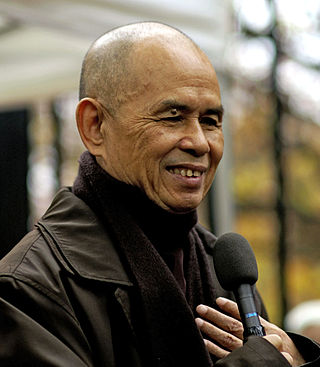
Thích Nhất Hạnh was a Vietnamese Thiền Buddhist monk, peace activist, prolific author, poet and teacher, who founded the Plum Village Tradition, historically recognized as the main inspiration for engaged Buddhism. Known as the "father of mindfulness", Nhất Hạnh was a major influence on Western practices of Buddhism.
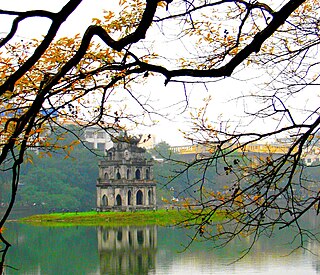
Hanoi, often just referred to, especially within Vietnam, as The Capital, is the capital and second-largest city of Vietnam. It covers an area of 3,359.82 km2 (1,297.2 sq mi). It consists of 12 urban districts, one district-leveled town and 17 rural districts. It is located within the Red River Delta of Northern Vietnam.

Ho Chi Minh City, formerly and still commonly known as Saigon, is the most populous city in Vietnam, with a population of around 9.3 million in 2023. Situated in the Southeast region of Vietnam, the city surrounds the Saigon River and covers about 2,061 km2 (796 sq mi).

Vietnam, officially the Socialist Republic of Vietnam (SRV), is a country at the eastern edge of mainland Southeast Asia, with an area of 331,212 square kilometres (127,882 sq mi) and a population of 99 million, making it the world's fifteenth-most populous country. Vietnam shares land borders with China to the north, and Laos and Cambodia to the west. It shares maritime borders with Thailand through the Gulf of Thailand, and the Philippines, Indonesia, and Malaysia through the South China Sea. Its capital is Hanoi and its largest city is Ho Chi Minh City.

The Fall of Saigon, also known as the Liberation of Saigon or Liberation of the South in Vietnam, and known as Black April by pro-South Vietnam overseas Vietnamese, was the capture of Saigon, the capital of South Vietnam, by the People's Army of Vietnam (PAVN) and the National Liberation Front of South Vietnam on 30 April 1975. The event marked the end of the Vietnam War and the collapse of the non-communist South Vietnamese regime as well as the start of a transition period from the formal reunification of Vietnam into the Socialist Republic of Vietnam under communist rule.
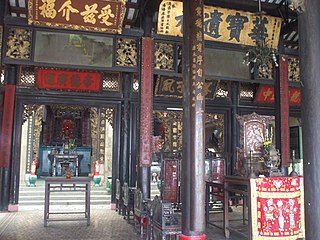
The Hoa people are citizens of Vietnam of full or partial Han Chinese ancestry. Chinese migration into Vietnam dates back millennia but contemporary Hoa today mostly refers to people of Chinese heritage who came to Vietnam from the 18th century, who especially trace their ancestry to various southern Chinese provinces. The Hoa are an ethnic minority group in Vietnam as part of the Chinese community there, and can also be found in other regions such as in the Americas. They may also be called "Chinese-Vietnamese" or "Chinese people living in/from Vietnam" by the Vietnamese.
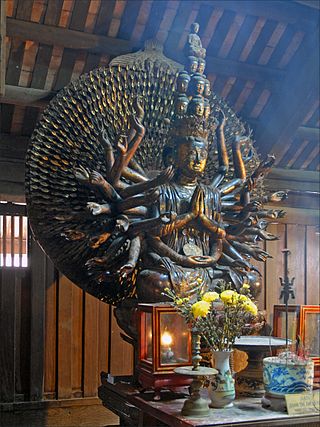
Buddhism in Vietnam, as practiced by the Vietnamese, is mainly of the Mahayana tradition and is the main religion, a combination of Pure Land and Zen (Thiền). Buddhism may have first come to Vietnam as early as the 3rd or 2nd century BCE from the Indian subcontinent or from China in the 1st or 2nd century CE. Vietnamese Buddhism has had a syncretic relationship with certain elements of Taoism, Chinese spirituality, and Vietnamese folk religion. Theravada Buddhism also exists, as well as indigenous forms of Vietnamese Buddhism such as Bửu Sơn Kỳ Hương and Hòa Hảo.
Đặng Nhật Minh is one of Vietnam's foremost film directors. He began making documentary films around 1965 and is the first Vietnamese person to be awarded the Nikkei Asia Prize for Culture, in 1999. His films have won several prizes at international film festivals.

Trần Thái Tông, personal name Trần Cảnh or Trần Nhật Cảnh, temple name Thái Tông, was the first emperor of the Trần dynasty, reigned Đại Việt for 33 years (1226–58), being Retired Emperor for 19 years. He reigned during the first Mongol invasion of Vietnam before eventually abdicating in favor of his son Trần Hoảng in 1258.

Ven. Thich Nhat Tu or Thích Nhật Từ (釋日慈) in Vietnamese is a Vietnamese Buddhist reformer, an author, a poet, a psychological consultant, and an active social activist in Vietnam. He is committed to propagate Buddha's teachings through education, cultural activities and charitable programs in order to benefit the individuals and the society at large.

The Chairman of the National Assembly of Vietnam, less formally the National Assembly Chairman, formerly designated as the Chairman of the Standing Committee of the National Assembly of Vietnam from 1946 to 1981, is the legislative speaker of Vietnam, presiding over the National Assembly. The National Assembly is, in the words of the constitution, "the highest representative organ of the people; the highest organ of state power".
Tuệ Trung Thượng Sĩ (1230–1291) was an influential Buddhist lay practitioner and skilled poet of the Thiền (Zen) tradition during the Tran Dynasty in Vietnam. Tue Trung authored treatises on Pure Land and Thien teachings.

Thầy Temple is a Buddhist temple in Quốc Oai District, Vietnam. The temple is also known as Thiên Phúc Tự. The temple was established in the 11th century during the reign of Emperor Lý Nhân Tông of the Lý dynasty. It is dedicated to Vietnamese Thiền master Từ Đạo Hạnh (1072-1116). It is one of the oldest Buddhist temples in Vietnam, It is well maintained by the monks.
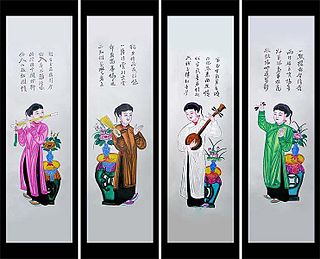
This article presents an overview of the Sports in Vietnam.
Throughout the history of Vietnam, many names were used in reference to Vietnam.
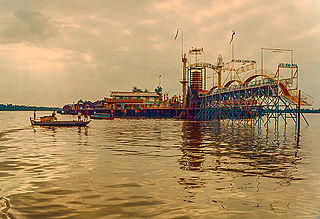
The Coconut Religion is a religion founded by Ông Đạo Dừa in Ben Tre, South Vietnam. It was one of many religions in the South until communist authorities abolished it in 1975. Dao Dua advocated religious harmony, synthesizing many religions, especially Buddhism and Christianity. The Coconut Religion is not currently recognized as a religion by the Vietnamese government.

Vietnamese folk religion is the ethnic religion of the Vietnamese people. About 86% of the population in Vietnam are associated with this religion.
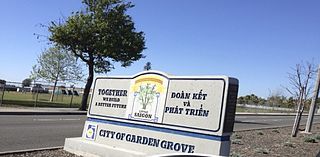
Vietnamese has more than 1.5 million speakers in the United States, where it is the sixth-most spoken language. The United States also ranks second among countries and territories with the most Vietnamese speakers, behind Vietnam. The Vietnamese language became prevalent after the conclusion of the Vietnam War in 1975, when many refugees from Vietnam came to the United States. It is used in many aspects of life, including media, commerce, and administration. In several states, it is the third-most spoken language, behind English and Spanish. To maintain the language for later generations, Vietnamese speakers have established many language centers and coordinated with public school systems to teach Vietnamese to students who are born and raised in the United States.

Khăn vấn, khăn đóng or khăn xếp, is a kind of turban worn by Vietnamese people which had been popular since Nguyễn dynasty. The word vấn means coil around. The word khăn means cloth, towel or scarf.
Đào Nguyên Cát is a Vietnamese economist, professor and journalist. He is the founding and current editor-in-chief of The Vietnam Economic Times, one of the country's oldest and most influential economics and business publications. He played a prominent role during Vietnam's Đổi Mới economic reform, and served as the Chairman of the Vietnam Economic Association. Professor Cát was awarded the Resistance Medal by the Government of Vietnam.
References
- ↑ Dodd, Jan; Lewis, Mark; Emmons, Ron (2003). Rough Guide to Vietnam. Rough Guides. p. 54. ISBN 978-1-84353-095-4 . Retrieved 16 July 2012.
- ↑ "Vietnam Economic Times". Mondo Times. Retrieved 16 July 2012.
- ↑ Lee, Rachel C.; Wong, Sau-Ling Cynthia (9 May 2003). Asian America.Net: Ethnicity, Nationalism, and Cyberspace. Routledge. p. 95. ISBN 978-0-415-96560-6 . Retrieved 16 July 2012.
- ↑ Vũ, Minh Tiến (2013-06-21). "GS Đào Nguyên Cát, TBT Thời báo Kinh tế Việt Nam: Nhất - có bốn… cái nhất!". Petro Times (in Vietnamese). Retrieved 2022-11-13.